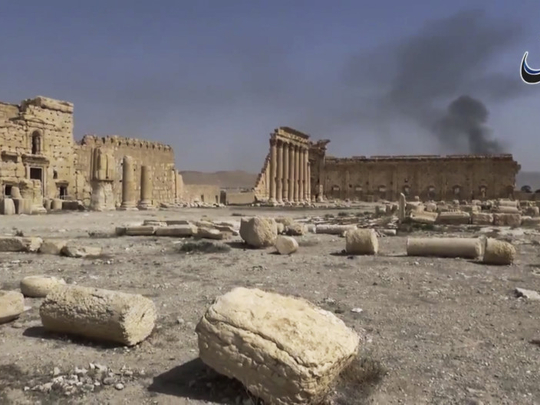
US Defence Secretary Ashton Carter made a bold observation recently when he said that the Iraqi army had lost the will to fight Daesh (the self-proclaimed Islamic State of Iraq and the Levant) militants.
He was referring to the bizarre retreat from the city of Ramadi in Al Anbar governorate by Iraqi security forces earlier this month, which led to its capture by the militants. Iraqi officials have said that the withdrawal was unjustified and Minister of Defence Khalid Al Obaidi promised to make those responsible accountable.
Deputy Prime Minister Saleh Al Mutlaq said the Iraqi army’s willingness to let Ramadi fall to Daesh “surprised all of us”. He told CNN that “It’s not clear for us why such a unit, which was supposed to be trained by the Americans for years, and supposed to be one of the best units in the army, would withdraw from Ramadi in such a way.”
US President Barack Obama described the fall of Ramadi as “a tactical setback”, but this was not the first time that the Iraqi army has had to flee from battle. Last June thousands of soldiers and tens of senior officers withdrew from Mosul, Iraq’s second largest city, leaving behind heavy weapons and delivering the city to Daesh militants without a fight.
The same is happening in Syria where government forces have fallen back in Idlib in the northwest in what was described as the biggest defeat for the regime in years. Days later, the Syrian army withdrew from the strategic city of Tadmur (Palmyra) in eastern Badiya as Daesh militants marched in facing little resistance. It is clear that the demoralised forces of Syrian President Bashar Al Assad have also lost the will to fight.
Those who are standing up to Daesh in Iraq are members of the paramilitary Shiite forces, reportedly led by Iranian generals. Just like the terrorists, they too are driven by religious zeal and sectarian hatred. The so-called Popular Mobilisation Forces (PMF) are better equipped and more organised than the Iraqi army. But most importantly, they are motivated to engage their enemy in what has become an open religious war.
In northern Syria, regime forces were chased out of Idlib by a recently-formed coalition of Sunni Islamic groups calling itself the Conquest Army, who are led by Al Qaida-affiliate Al Nusra Front.
The coalition has become the main fighting force in the insurgency in Syria, expanding its presence to most of Aleppo. In Al Qalamoun mountain range, along the Syrian-Lebanese border, the Conquest Army is engaged in bloody battles against Hezbollah fighters.
In his recent statements, Hezbollah leader Hassan Nasrallah was clear that fighting the terrorists has become the sole duty of his movement and that his group was ready to die for that cause. Again sectarian animosities are driving the two sides to a bitter and existential fight. One thing is clear: Hezbollah has found itself engaged in a war of attrition and is now worried that its fate is linked to that of the Al Assad regime.
This inter-religious war is a tragic outcome of the protracted conflicts in Syria and Iraq. Carter’s observation failed to explain why the Iraqi army has lost the will to fight. But the answer is obvious. America’s invasion of Iraq and its myopic actions there have prepared the ground for sectarian confrontations and foreign involvement. Iraq has been torn by Iranian meddling, on the one hand, and American lack of strategy on the other. The country has become a failed state, troubled by sectarian politics aimed at deepening the Sunni-Shiite divide. Massive corruption, political bickering and failing national institutions provided a fertile ground for religious extremists on both sides to emerge.
Iraq and Syria have become the scenes of proxy sectarian wars between regional countries like Iran, Saudi Arabia, Qatar and Turkey.
In Syria, the failure of the international community to push for a political solution to end the conflict there has led to the militarisation of what began as a peaceful uprising. The complicity of neighbouring countries, by allowing thousands of foreign terrorists to enter Syria, has led to the polarisation of conflict.
The regime is guilty of carrying out daily atrocities against its own people and its refusal to reach a compromise with the Syrian opposition has eventually drained its resources. The so-called moderate opposition has been replaced by extremist groups, which now find themselves entangled in a holy war against the regime and its Iranian and Hezbollah backers.
This religious-regional war, which now extends as far as Yemen, will weaken what remains of national institutions holding together what is left of Iraq and Syria. The sectarian divide will deepen and both countries will be broken up and divided along ethnic and religious fault lines.
The regular armies will become marginalised and will be replaced by militias and groups fighting under different sectarian banners. At one point Sunni groups, such as Daesh and Conquest Army, will fight each other for control of territory while the Iran backed Shiite groups will face opposition from rivals from the same sect. It is a recipe for chaos and disaster.
One way to stop this suicidal tide is for a regional understanding to put an end to the conflicts in both Syria and Iraq. In Syria the regime must accept a political compromise, which excludes Al Assad, while in Iraq, the political leadership must reach a new accord to end sectarian confrontations and preserve the unity of the country. Otherwise, Daesh and other fanatical groups will end up controlling fiefdoms over what remains of both countries.
Osama Al Sharif is a journalist and political commentator based in Amman.










